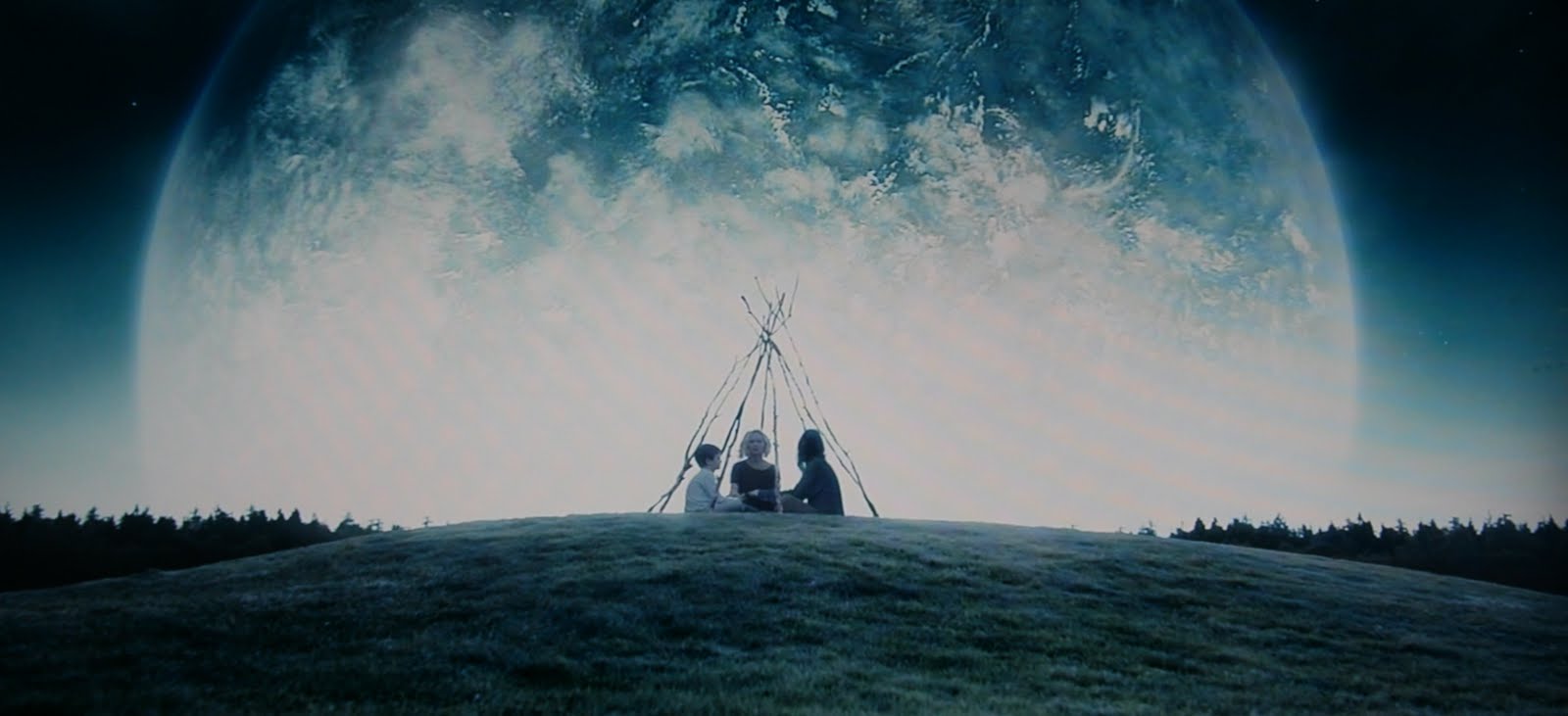Have you had a bout of the Melancholia? Do lower key movies interest you? What about movies that are baffling in the extreme? All three? Then maybe this movie is for you. Personally, wasn’t enormously into it, until it was completely over and I had this ear-splitting epiphany regarding what I had just watched. Like, no idea, no idea… IDEA! hahaha. Changed everything for me. But I think I was just being way way way too literal for some reason when I walked into this one. Brain was just locked into the wrong gear or something. So, maybe we could walk through this thing at a high level and then compare answers and see if we are even close to being on the same page.
But first, if you are new here… (insert low bow with grand arm waving and flourishes) WELCOME fine lady, sir, madam, gentleman! We are honored to have you. Here at THiNC. we (refer to ourselves in the 3rd person plural) enjoy discussing complicated/outlandish, difficult to understand movies. You know. Movies like Primer, Circle, The One I Love, and the like. But those are easy, easy easy movies. What about movies like The Maus, 10×10, and The Invitation? Because, you know what? Hollywood fails us regularly, but it’s these amazing independent film makers that blow our minds day in and day out. So why don’t we build a little enclave of people that enjoy these movies and don’t invite anyone else to join in!?!? Brilliant. Let’s do it.
Anyway, here’s the trailer for Melancholia…
Melancholia – Justine
The opening kicks off with crazy cut scenes that are impossible to understand… unless, that is, you get where the entire movie is going. We see scenes of individuals slogging through the mud of a field, and images of a planet exploding. Trust me, I had zero idea what was going on here until I epiphanied.
When the movie starts, properly, we see that Justine (played by Kirsten Dunst of Interview with a Vampire fame) is getting married to Michael (played by Alexander Skarsgård – who was great in the recent Hold the Dark which I’ll be talking about soon). But nothing is going right on her wedding day at all. The limo gets stuck, the bride and groom arrive 2 hours late. And worse? The family are mad, and outspoken about said madness throughout. Eventually she runs from the festivities and rides a golf course away. Then just randomly reappears. Later she walks away before the cake cutting and heads upstairs to take a bath. Are you sensing a theme of detachment and a difficulty dealing with reality. Great. You guys are so awesome.
We also learn that Justine, a cutthroat ad designer, gets promoted by her boss mid-toast at the wedding. This seems like a good thing at first. But when Tim (Brady Corbet), a co-worker who is in need of getting a tag line from Justine fails, all manner of drama ensues. Including Justine ending up unable to consummate her wedding with her new husband, she makes love to Tim on the golf course instead.
Melancholia – Claire
In the opening of the film, quite a bit of attention is paid to Antares, a particular star that Justine notices. But in the second half of the movie, the star is gone. John (played by Kiefer Sutherland of 24 fame) tells us that this newly discovered rogue planet has blocked our view of the star. Not only that, but John is excited to witness this planet as it slips by earth, on its way out of the solar system.
Jumping forward a few months, we see that Justine, and her depression, has grown significantly worse (maybe the movie should have been called Catatonia, not Melancholia). Thankfully, Claire and John are kind enough to look after her. Even her relationship with her favorite horse, Abraham falls apart, ending in a brutal scene where Justine whips him savagely.
Jumping to John and Claire, John is certain that the planet will slide safely by. But Claire, having listened to internet prognosticators, has decided that the end of the world is coming. Then Justine tells Claire that she is certain that the planet will hit the earth and end all life in the universe. Which, she says, is great, because you know what? The earth, its inhabitants, all of it, is horribly evil. Well, actually, Melancholia, the planet? It actually does miss earth. Hooray! The earth is saved!!
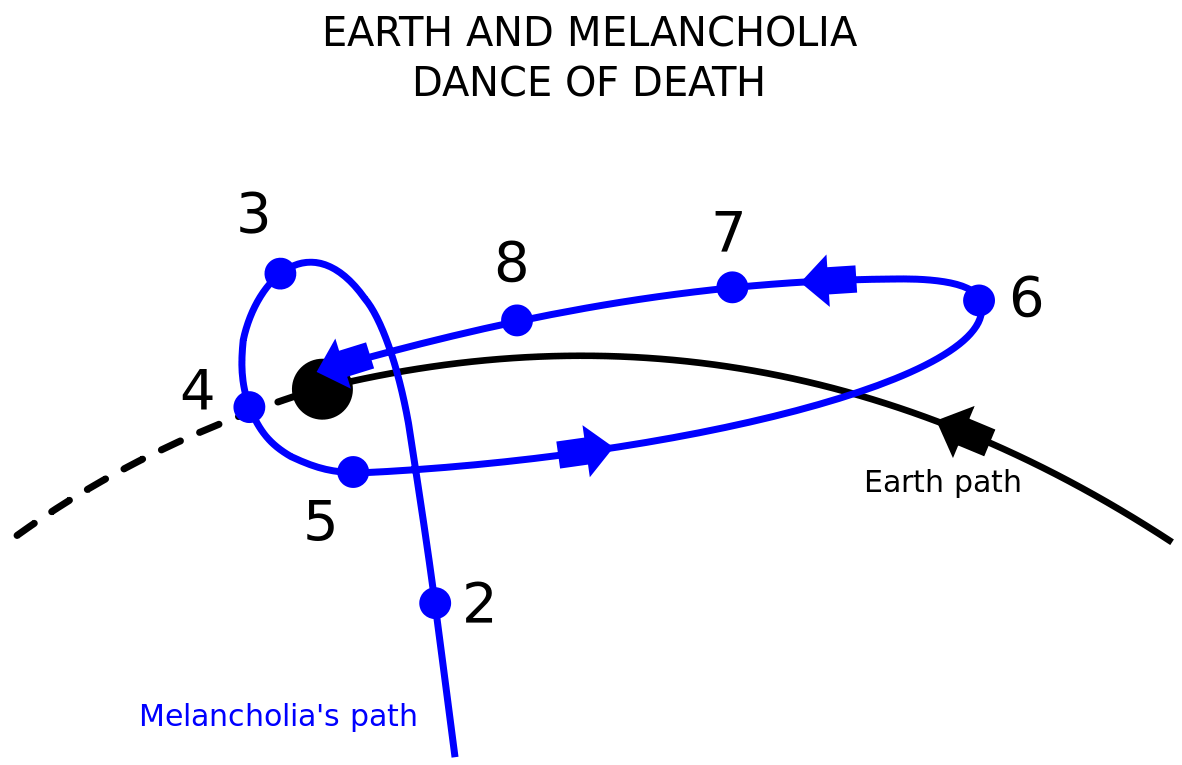
Only trouble is, Melancholia swings by earth, orbits it once and then trails out behind the planet. Then, afterwards, chases earth down from behind. Claire realizes this is what is about to happen when Melancholia begins to get bigger again. John, realizing his error, and knowing that the planet was bound to end earth, commits suicide via poison in Abraham’s stable. We shall be discussing this together anon. Promise. Anyway, Claire releases Abraham to cover up the suicide. (Which, is hilarious if you think about it… who cares at this point?!? We are a curious lot, humans.)
After realizing what is going to happen, she calls the family together for a normal breakfast together, but when that idea is shattered by hail, caused by Melancholia, she panics and tries to escape. But every mode of escape fails her, the cars, the golf cart, etc. She heads back to the resort. Justine and Claire argue, unsure about what they should be doing for the last few minutes that they have.
Well, when Claire’s son Leo, notices Abraham wandering about the property sans his father, he begins to come unglued. Leo quotes his father completely at whit’s end, “There’s nothing to do, nowhere to hide.” But then Justine comes to the rescue, letting him know that they can all be safe in a “magic cave” that will protect them all from coming doom. Now, it should be said, that Justine had promised to make Leo this magical cave several times throughout the course of the movie. But that she hadn’t made due on the promise until now. Now, what happens next is crucial. Leo, he buys the lie… and he closes his eyes believing that they are now safe. Claire just loses it. Cries, flips out, basically. But Justine? She watches them both. She accepts the coming doom stoically and with a calm repose.
The Inner Workings of Melancholia
The thing that clicked for me, the eye opening epiphany that I realized late in the game, is that the mechanics of the movie are simply there to subject the world to the normal inner workings of depression. The first half shows us the mental cogs of Justine’s mind. She is completely adrift as a result of her depression. She is aloof, distant, incomprehensible to the rest of the people in the film. But as the movie inflicts a depression inducing event on the entire planet? Justine’s mood does a 180. We watch as she balances the reality of the calamity with the knowledge that she has dealt with chaos in her life before. She muscles the inner reserve and consumes this information with aplomb. Right?
But the rest of the world? Goes ape shit. Not to put too fine a point on it. Claire, our foil for the entire planet, at first struggles with these new facts, struggles to consume them, wrap her brain around them. (Like for example covering up her husband’s suicide… right?) And then she just absolutely loses it. Get it? The utter helplessness of the situation for everyone on the planet? This is the epitome of depression. But instead of the situation being 100% inexplicable, they have a cause, and they know why.
Now, think about John’s suicide. He’s one of the last people that you’d expect to commit suicide. Knowledgeable and self confidant. But when faced with the immovability of his own end, he punches out. It’s ironic. Right? John, in normal daily life, is controlled and confident. But when real trouble that he can’t out maneuver? He quits. But what about Justine? She takes a measure of peace from the inevitability of it.
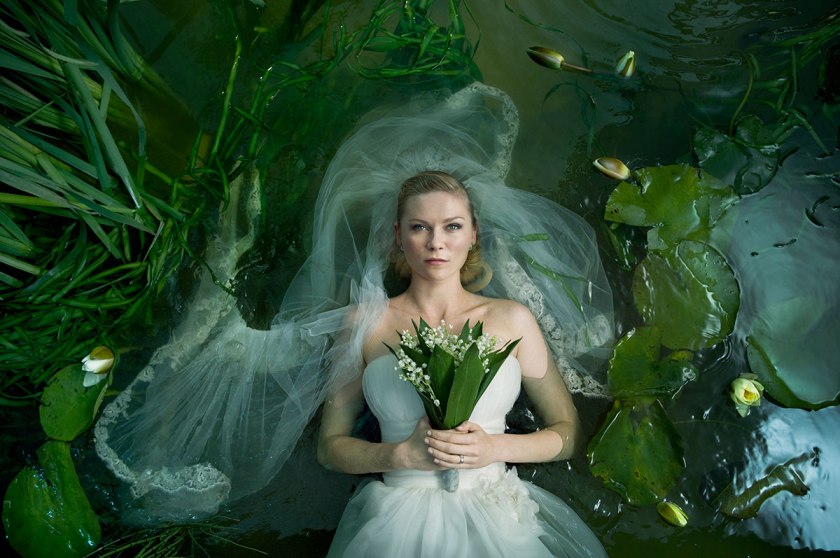
This photo of Justine, full wedding gown, floating in the river is fairly significant. So much so, that I think we are given much of the answers to understanding the movie Melancholia from it alone. Wait, what??! I hear you yelling at me.
Ophelia is one of the greatest artistic muses of the last 400 years – heck, across all of western culture. Ophelia is a key player in the Shakespearian play, Hamlet. Which is, in my humbly correct opinion, the greatest Shakespearian play of them all. If you are unfamiliar with the play, it’s a great setup. Hamlet, the prince of Denmark, has become sad with the death of his father. Worse? His mother, days later, is now dating his father’s brother. And to flip the script a little more, his father, the dead king, is now appearing to Hamlet as a ghost and imploring to avenge his death.
Meanwhile, Hamlet had been romantically attached to Ophelia. They were all a twitter, much like Romeo and Juliet, until Hamlet appeared to lose his mind. He’s fairly certain that her father and brother are using Ophelia to milk him for information and as such is shutting Ophelia down in the cruelest way imaginable. Seeing his change, her father Polonius, and her brother Laertes, tell Ophelia Hamlet is mad and to steer clear. But Hamlet kills Ophelia’s father, Polonius, in his mother’s room. With this, believing her love is insane, and her father now dead, Ophelia snaps and throws herself into the river to die.
Now, Justine might not be dating the son of a king that has recently been murdered, but she also seems to have just as little control in her situation as Ophelia has. She seems to be trapped in this unavoidable marriage. She’s buffeted and controlled to do this, or to be that. Hamlet’s Ophelia could just as much be a commentary on the social expectations of women in that day. But the situation for Justine hasn’t progressed much further beyond Ophelia’s options and opportunities either. Ophelia must have been depressed at her tightening situation. Controlled and demanded to act certain ways from contradictory directions.
But the trick here with our modern Ophelia, is that instead of committing suicide, as Ophelia did, instead she soldiers through in spite of her situation. And instead of allowing the end of the world to send her over the edge, she is the one that navigates that situation with the utmost sanity and lucidity.
Melancholia is a commentary on the cultural assumptions and opinions of depressives. Our belief that they are broken, and to be pitied. It is a statement movie, a statement that indicts our culture as being the ones that are missing the enormous heft and weight bearing down on the world today. That we actively avoid thinking about the harder things in life. That we actively avoid the pains that surround us today. (We are, after all, all going to die in the end… if that isn’t worth being depressed about I don’t know what is.) We avoid considering the social pressures locking us into norms and behaviors we would never participate in if given the chance.
While I wasn’t a huge fan of the movie, once I understood the larger point it was trying to make, it was an enlightening perspective to consider. What did you think of the film? Am I reading into it (like normal?) or have accurately captured the larger point that Lars von Trier is trying to make?
Edited by, CY
Bespoke Movie Recommendations |
||
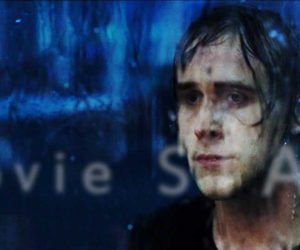 |
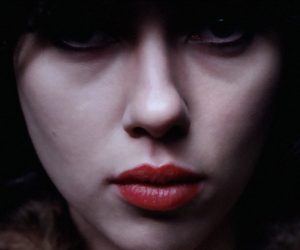 |
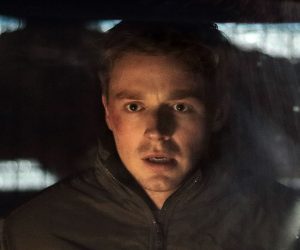 |

